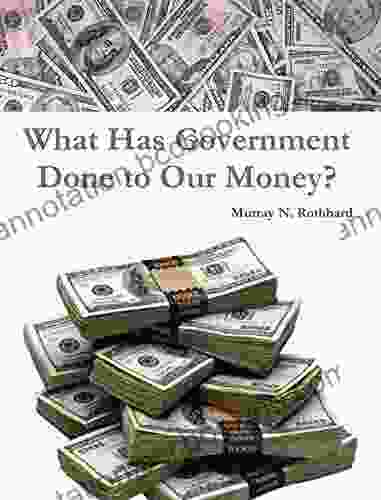What Has Government Done To Our Money? The Shocking Truth!

Money is a fundamental part of our lives. We use it to buy food, pay rent, and save for the future. But what if I told you that the money you're using today is not the same as the money your parents or grandparents used?
4.6 out of 5
| Language | : | English |
| File size | : | 593 KB |
| Text-to-Speech | : | Enabled |
| Screen Reader | : | Supported |
| Enhanced typesetting | : | Enabled |
| Word Wise | : | Enabled |
| Print length | : | 116 pages |
Over the years, governments have been quietly changing the way money works. They've inflated the currency, devalued it, and eroded its purchasing power. And all of this has been done without our knowledge or consent.
Inflation: The Silent Thief
Inflation is one of the most insidious ways that governments can steal from their citizens. It's a slow and steady process that can eat away at your savings and make it harder to afford the things you need.
Inflation occurs when the government prints more money than is needed. This causes the value of money to go down, which means that each dollar you have today is worth less than it was yesterday.
The effects of inflation can be devastating. It can make it harder to afford food, housing, and other necessities. It can also erode the value of your savings and make it harder to retire.
Devaluation: Another Way to Steal
Devaluation is another way that governments can steal from their citizens. It occurs when the government reduces the value of its currency relative to other currencies.
Devaluation can have a number of negative consequences. It can make it more expensive to import goods and services. It can also make it harder for businesses to compete in the global marketplace.
In some cases, devaluation can even lead to hyperinflation. This is a condition where prices rise so rapidly that money becomes worthless.
Erosion of Purchasing Power
The erosion of purchasing power is another way that governments can steal from their citizens. It occurs when the government takes steps that make it harder to buy goods and services.
There are a number of ways that governments can erode purchasing power. They can raise taxes, increase regulations, or impose tariffs.
When the government raises taxes, it takes more money out of your pocket. This makes it harder to buy the things you need.
When the government increases regulations, it makes it more expensive for businesses to operate. This can lead to higher prices for goods and services.
When the government imposes tariffs, it makes it more expensive to import goods. This can also lead to higher prices for goods and services.
The Hidden Agenda
So why are governments ng all of these things? What's their hidden agenda?
There are a number of reasons why governments might want to devalue their currency or erode purchasing power. One reason is to make it easier to pay off their debts. When the value of money goes down, the government's debts become less valuable.
Another reason why governments might want to devalue their currency is to boost exports. When the value of a currency goes down, it makes it cheaper for businesses to export their goods and services.
Finally, governments might also want to devalue their currency or erode purchasing power to control inflation. When the value of money goes down, it makes it harder for businesses to raise prices.
The Consequences of Government Theft
The consequences of government theft are far-reaching. Inflation, devaluation, and the erosion of purchasing power can all have a devastating impact on our lives.
Inflation can make it harder to afford food, housing, and other necessities. It can also erode the value of your savings and make it harder to retire.
Devaluation can make it more expensive to import goods and services. It can also make it harder for businesses to compete in the global marketplace.
The erosion of purchasing power can make it harder to buy goods and services. It can also lead to lower wages and higher unemployment.
What Can We Do?
So what can we do to stop government theft? There are a number of things we can do.
First, we can educate ourselves about the issue. The more people who understand what's going on, the harder it will be for governments to get away with it.
Second, we can support organizations that are fighting against government theft. There are a number of organizations that are working to educate the public about the issue of government theft.
Finally, we can vote for candidates who are committed to fighting against government theft. When we vote for candidates who understand the issue and are willing to take action, we can make a difference.
Government theft is a serious problem that is having a devastating impact on our lives. It's time for us to take action and stop it. By educating ourselves, supporting organizations that are fighting against government theft, and voting for candidates who are committed to fighting against government theft, we can make a difference.
The future of our money is in our hands. Let's not let governments steal it from us.

4.6 out of 5
| Language | : | English |
| File size | : | 593 KB |
| Text-to-Speech | : | Enabled |
| Screen Reader | : | Supported |
| Enhanced typesetting | : | Enabled |
| Word Wise | : | Enabled |
| Print length | : | 116 pages |
Do you want to contribute by writing guest posts on this blog?
Please contact us and send us a resume of previous articles that you have written.
 Book
Book Novel
Novel Page
Page Chapter
Chapter Text
Text Story
Story Genre
Genre Reader
Reader Library
Library Paperback
Paperback E-book
E-book Magazine
Magazine Newspaper
Newspaper Paragraph
Paragraph Sentence
Sentence Bookmark
Bookmark Shelf
Shelf Glossary
Glossary Bibliography
Bibliography Foreword
Foreword Preface
Preface Synopsis
Synopsis Annotation
Annotation Footnote
Footnote Manuscript
Manuscript Scroll
Scroll Codex
Codex Tome
Tome Bestseller
Bestseller Classics
Classics Library card
Library card Narrative
Narrative Biography
Biography Autobiography
Autobiography Memoir
Memoir Reference
Reference Encyclopedia
Encyclopedia Richard G Klein
Richard G Klein Sonia Hartl
Sonia Hartl Sheila Hale
Sheila Hale Anita Brookner
Anita Brookner Mara Vorhees
Mara Vorhees Larry Smith
Larry Smith Juanita Davis
Juanita Davis Michael Connelly
Michael Connelly Garden Knits
Garden Knits Camieyes Inc
Camieyes Inc Lj Andrews
Lj Andrews Gareth Owen
Gareth Owen Juliet Blankespoor
Juliet Blankespoor Charles River Editors
Charles River Editors Gail Fishman
Gail Fishman Gajendra Kumar
Gajendra Kumar Tad Friend
Tad Friend Greg Sadowski
Greg Sadowski Nancy Jean Vyhmeister
Nancy Jean Vyhmeister P Planat
P Planat
Light bulbAdvertise smarter! Our strategic ad space ensures maximum exposure. Reserve your spot today!

 Arthur C. ClarkeUncover the Enchanting Basque Country: A Journey through History, Culture,...
Arthur C. ClarkeUncover the Enchanting Basque Country: A Journey through History, Culture,... David MitchellFollow ·6.8k
David MitchellFollow ·6.8k Francisco CoxFollow ·12.6k
Francisco CoxFollow ·12.6k Chase MorrisFollow ·17.7k
Chase MorrisFollow ·17.7k Dave SimmonsFollow ·4.8k
Dave SimmonsFollow ·4.8k Clinton ReedFollow ·10k
Clinton ReedFollow ·10k Herbert CoxFollow ·11.3k
Herbert CoxFollow ·11.3k Todd TurnerFollow ·19.9k
Todd TurnerFollow ·19.9k Ruben CoxFollow ·12.6k
Ruben CoxFollow ·12.6k

 Voltaire
VoltaireStories From The Jim Crow Museum: Unveiling the Haunting...
A Journey into the Depths of...

 F. Scott Fitzgerald
F. Scott FitzgeraldCalling Sorcery And Society: Illuminating the...
: The Alluring Embrace of Sorcery ...

 Marcel Proust
Marcel ProustBranding Bud: Unveiling the Green Rush
As the legalization...

 Henry Wadsworth Longfellow
Henry Wadsworth LongfellowColorful Dreamer: The Story of Artist Henri Matisse
Henri Matisse was a French artist...

 Adrian Ward
Adrian WardDelving into the Tapestry of Black British Identity: A...
In the realm of historical...
4.6 out of 5
| Language | : | English |
| File size | : | 593 KB |
| Text-to-Speech | : | Enabled |
| Screen Reader | : | Supported |
| Enhanced typesetting | : | Enabled |
| Word Wise | : | Enabled |
| Print length | : | 116 pages |












